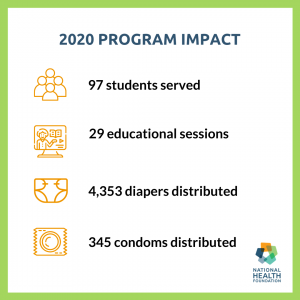Teenagers face many difficult decisions when it comes to sexual health and their future. With access to so much information online and the growing presence of social media, teens are exposed to an array of information regarding sexual and reproductive health1. And while many teens turn to social media for trusted information, we also know there is a presence of misinformation as platforms are unregulated. So, how do we address this?
One way is through in-person educational courses with trusted sources to provide accurate and timely information for youth on sexual health. With this approach, teens can have access to reliable information that will enable them to make informed decision on their sexual health. According to The National Coalition for Sexual Health, youth are more likely to practice safe sex, delay a sexual relationship, and minimize the risk for an unplanned pregnancy after having received sexual health education2. That is why National Health Foundation is proud to provide sexual health education courses across Title 1 schools in South and East Los Angeles.
Be a Star
The Be a Successful Teen Acting Responsibly (Be a STAR) program is a 10-week course, where participants learn a variety of topics regarding sexual health, relationships and academic success. Courses are tailored for high school youth and provide community resources to help students prepare for a successful future both personally and academically. In 2019, 139 students graduated from the program.
“Be a STAR is an amazing program. You learn so much [about sexual health] and Ms. Lauren is super amazing!” Jenny H., Be a STAR participant.
In March of 2020, NHF adapted to the Stay-at-Home order by providing virtual classes that were open to the public. Within weeks, the Be a STAR virtual program grew from 6 participants to 45, demonstrating the need for programming that supports sexual and reproductive health among teens. Even graduates from prior NHF groups reached out to participate in the program.
Pregnant & Parenting Teens
While teens served by the Be a STAR program face many challenges, parenting teens, have a unique set of needs. Parenting teens are more likely to drop out of high school, with only 53% of teen moms graduating high school after having their child3. To support this population, NHF provides tailored education for young parents through our Pregnant and Parenting Teen Program (PPT). This 12-week evidence-based curriculum covers crucial topics like time management, budgeting and sexual health, with an emphasis on resources and information parents need to advocate for themselves and their families.
Through a series of focus groups, surveys, and informal interviews Program Coordinator Lauren Brunet and Program Manager Grace Cotangco identify key barriers to pregnancy prevention and academic success ranging from family planning, to relationship issues, to childcare access. By identifying these areas, NHF provides specialized courses and resources to address these needs.
“NHF helps our students by providing an education that supports body autonomy and empowers young people to make the right choices to support their lives. Lauren, our NHF educator, provides a space for my students to ask questions and learn.” Tanya Lentz, Teacher at McAlister Central High School.
Moving Beyond Educational Resources
While NHF values the importance of skills development, we also understand that parenting teens have immediate needs for items such as diapers and other essentials. Through our partnership with Baby2Baby, NHF is able to donate diapers, wipes and baby formula to students as incentives for participating in the program. As such, NHF is able to meet immediate needs, while also fostering investigative skills that enables young mothers to make informed decisions for themselves and their families.
Despite challenges faced during the pandemic, in 2020, NHF’s education programs have continued to provide critical resources and support.
Sources:

